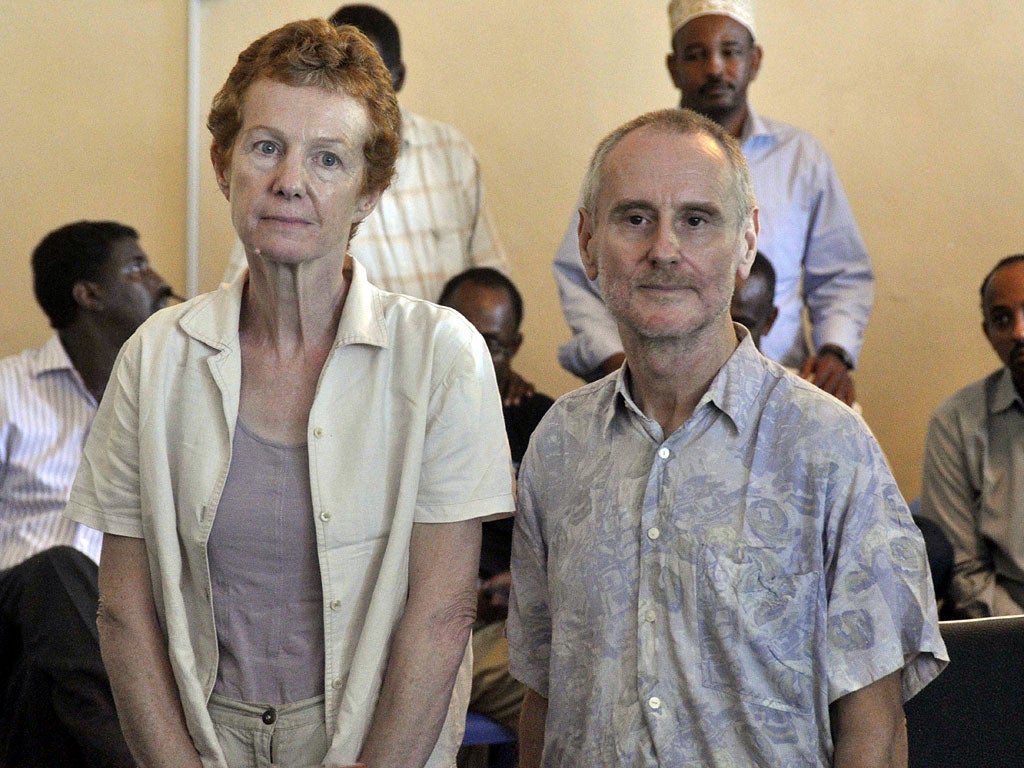Kidnap couple call for intervention to stop Somali pirates
British government under pressure to act as economic costs of Indian Ocean attacks mount

A British couple held captive by Somali pirates for 13 months have launched a scathing attack on Britain's efforts to tackle piracy. Paul and Rachel Chandler, whose yacht was hijacked in the Indian Ocean in 2009, gave a warning that "people will have to die" before a solution is found.
Speaking before they give evidence to MPs investigating piracy tomorrow, they accused the Government of lacking political will to take a more "interventionist" approach. If the Royal Navy did not take direct action against the pirates "they might as well come home", Paul Chandler said.
The Chandlers, from Tunbridge Wells, Kent, were held hostage after Somali pirates kidnapped them from their yacht at gunpoint near the Seychelles in October 2009. They were freed in November 2010 after a $1m ransom payment was reputedly paid.
MPs on the Transport Select Committee are carrying out the investigation amid growing concern over the failure of naval forces to act as a deterrent and mounting frustration in bringing those responsible to justice.
"It is a question of having the political will to take action and take on the criticism that will come from liberals from Western countries when they see people dying, because, unfortunately, people will have to die if there's to be a solution to the problem," Mr Chandler said. "The longer it's left, the more people are going to die." He branded David Cameron and other Western leaders as "vanity politicians". "It strikes me that no one wants to solve it. The Western countries could get it under control but there are no votes in it and no political will. It needs to be addressed."
He criticised the Royal Navy's efforts to combat piracy: "If the Royal Navy are not going to take any action they might as well come home to save the money. Whether we have one frigate there or not isn't the point. If they are directed not to intervene and take the pirates on board, find the dead ones and send them packing, then they are serving no use."
Mr Chandler added: "I don't think it helps to conflate the piracy issue with that of Somalia. The problems in Somalia may take a generation or two, and I don't think the maritime world of commerce can sit back and wait for that. It has to be tackled as a separate operation."
Anxious to avoid criticism, it is understood the Government is poised to launch a series of initiatives to crack down on the problem. Britain is in talks with the Seychelles to host a new maritime intelligence centre, including help from the UK's Serious Organised Crime Agency. It will also provide more than £4m aid to Mauritius, the Seychelles, Tanzania and Somalia to help to combat piracy and promote economic development.
Meanwhile, Britain is set to drop its opposition to the use of private armed guards on board UK-flagged vessels. The UN says that Somalian piracy costs the world economy between £4bn and £7bn each year. It estimates that 4,185 seafarers were attacked by pirates using firearms last year, 1,090 were taken hostage; and 516 were used as human shields.
Security experts have cautioned that the recent development of sea-launched land attacks by Somali pirates has increased the pressure for firmer action. The murder of David Tebbutt and the kidnap of his wife, Judith, from a Kenyan beach resort last month was followed by the kidnapping and death of a French national.
"We are seeing a significant step-change in the outlook of Somalian piracy," one security source said. "They are aware they no longer have to mount complex sea-based operations – when the same stature of foreign national is available in the form of tourists in neighbouring countries such as Kenya and the Seychelles."
Additional reporting by Anthony Peyton
Join our commenting forum
Join thought-provoking conversations, follow other Independent readers and see their replies
Comments
Bookmark popover
Removed from bookmarks